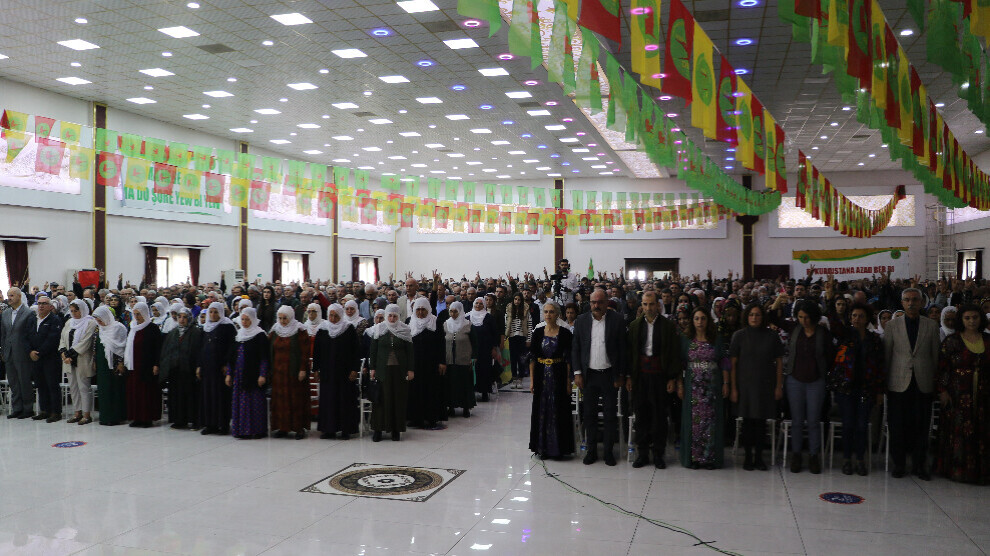DBP Conference: Time for freedom and great successes in Kurdistan
The DBP held a conference in Amed under the motto “Let’s build a free future with a free society.”
The DBP held a conference in Amed under the motto “Let’s build a free future with a free society.”

The DBP (Party of Democratic Regions) held a conference in Amed (tr. Diyarbakir) in the run-up to its 6th party congress in Ankara on 12 November. Thousands of people from the Kurdish region of Turkey took part in the event in the district of Bağlar. Kurdish-language banners clarifying the goal of the party read: "Building a free life with an organised society" and "Women organise life".
The conference began with welcoming speeches by DBP co-chairs Saliha Aydeniz and Keskin Bayindir, who are both members of parliament in Turkey. The DBP is a sister party of the HDP (Peoples’ Democratic Party), which has taken a back seat due to an ongoing ban procedure and has handed over its competences to the HEDEP (Peoples’ Equality and Freedom Party).
In his speech, Keskin Bayindir addressed the current political situation in the Middle East and said that the system of capitalist modernity was on the verge of collapse: "No power can prevent this collapse any longer. The reason for the wars in the Middle East is one of the consequences of this collapse. Hegemonic powers have turned the geography of the Middle East into a battlefield. World War 3 has begun and continues, at great cost to humanity as a whole. The entire Middle East, especially Kurdistan, has turned into a bloodbath. In the year of the centenary of the Treaty of Lausanne, new steps are being taken to reshape the Middle East. This is clearly demonstrated by the situation in Kurdistan, Afghanistan, Armenia, Azerbaijan, Iraq, Syria and Palestine. Attempts are being made to deprive the peoples of their future through war and occupation. We can say that capitalist modernity is targeting Kurdistan in particular."
The main cause of wars and crises is the "divide and rule" mentality of nation states, said Bayindir and continued: "As long as the identity and status of peoples are not recognised, the bloodshed in the Middle East will not stop. Nation states are cultural genocide, assimilation, denial, identity genocide, plunder, destruction and monistic mentality. For this reason, nation states cannot be a solution to crises in the Middle East or anywhere else in the world. The model of the nation state cannot be a remedy for the Middle East. We see this reality today in the Palestinian-Israeli war. The only solution is the model of democratic modernity. With it, freedom in Kurdistan and democracy in the Middle East are possible. In the Democratic Modernity model, all identities and beliefs can express themselves freely. It stands for communal life and was established in Rojava with great effort. We can clearly see the results of this. Despite the attacks, all identities, beliefs and cultures live together in Rojava. The peoples of Rojava are sowing the seeds of freedom together. Rojava shows that democratic modernity is not a dream. We can realise this model everywhere."
Keskin Bayindir went on to say that a political solution to the Kurdish question was a fundamental prerequisite for peace in the Middle East and at this point proposed democratic confederalism as an alternative to the nation state model. “The confederal model proposed by Abdullah Öcalan gives hope to the oppressed peoples in the Middle East and in other parts of the world. The architect of this model is Mr Öcalan," stated the DBP co-chair and called for a return to the Dolmabahçe Consensus of 2015.
According to Bayindir, one of the reasons for the isolation of Abdullah Öcalan and his proposed solutions and the intensification of the Kurdish question is the fragmentation of Kurdish society: "The main task of the DBP is to organise society and ensure national unity. This is important in order to give Kurdish achievements a permanent status. The future and the achievements of the people of Kurdistan must not be misused for personal interests. Our attitude towards collaborators who jeopardise the future of the Kurdish people must be clear. Our main task is to build a strong struggle and unity that the Kurdish people can be proud of. No power will be able to stop the Kurdish people on their way to freedom and success. The Kurdish people will democratise their country and build a free life in Kurdistan. Now is the time for great achievements in Kurdistan, for the freedom of women and the people. It is time for freedom. It is time to build an ecological and democratic life in Kurdistan."